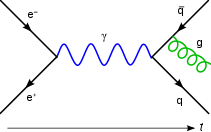Toichiro Kinoshita | |
|---|---|
 | |
| Born | 木下東一郎, Kinoshita Tōichirō January 23, 1925 |
| Died | March 23, 2023 (aged 98) |
| Occupation | Theoretical physicist |
| Known for | Kinoshita–Lee–Nauenberg theorem Cornell potential |
| Awards | Sakurai prize (1990) Guggenheim Fellowship (1973) |
| Academic background | |
| Education | University of Tokyo |
| Doctoral advisor | Sin-Itiro Tomonaga |
| Academic work | |
| Discipline | Physics |
| Sub-discipline | Theoretical Physics |
| Institutions | Cornell University |
| Quantum field theory |
|---|
 |
| History |
Tōichirō Kinoshita (木下東一郎, Kinoshita Tōichirō ; January 23, 1925 – March 23, 2023) was a Japanese-born American theoretical physicist.
Kinoshita was born in Tokyo on January 23, 1925. He studied physics at the University of Tokyo, earning his bachelor's degree in 1947 and then his PhD in 1952. Afterwards he spent two years as a postdoctoral researcher of the Institute of Advanced Study, Princeton, New Jersey, and then one year at Columbia University. His research interests included quantum field theory, and the Standard Model.[1]
Kinoshita worked at the Newman Laboratory of Nuclear Studies at Cornell University from 1955. He was at first a research associate. In 1958 he became assistant professor, and in 1960 associate professor. He became a full professor in 1963, and in 1992 he was appointed Goldwin Smith professor. In 1995 he retired from Cornell as professor emeritus. In 1962–63 he was a Ford Fellow at CERN. He was a guest professor at the University of Tokyo, at CERN, at the national laboratory for high-energy physics KEK in Japan, and at RIKEN in Japan.[1][2]
Kinoshita was known for his extensive and detailed calculations of quantum electrodynamics (QED), the theory of the interaction of light and matter, on which physicist Abraham Pais called him the "expert among experts".[3] QED is often described as the most accurate physical theory in existence. Among the best-known examples are Kinoshita's calculations of the anomalous magnetic moments of the electron and the muon.
- ^ a b T. Kinoshita. History. American Institute of Physics (AIP). Accessed October 4, 2018.
- ^ "Toichiro Kinoshita, Department of Physics". Cornell University (physics.cornell.edu).
- ^ Pais, A.1986. Inward Bound: Of Matter and Forces in the Physical World. Oxford: Oxford University Press, p. 466.